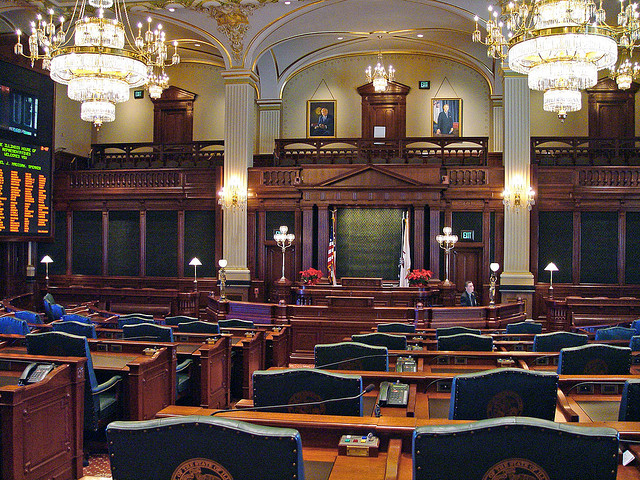Legislators return to Springfield to debate pensions, $2.7 billion in Medicaid cuts
By Caroline O'Donovan

Legislators return to Springfield to debate pensions, $2.7 billion in Medicaid cuts
By Caroline O'Donovan
Lawmakers reconvene in Springfield Tuesday to begin debating the ongoing budget crisis, including Gov. Pat Quinn’s proposal for cutting $2.7 billion from the state’s Medicaid funding. For the past three years, the legislature has knowingly passed unbalanced budgets, exacerbating its major debts. Leading legislators and the governor have all made statements regarding the urgency with which this issue, as well as the impending pension crisis, must be deliberated; however, according to Fox News, the governor’s working commission on pension funding has already delayed their initial report from today to later this week. On Eight Forty-Eight this morning, Tony Sarabia will circle up with some of our downstate reporters to discuss the governor’s impending remarks and how they might affect new policy.
But first, WBEZ reporter Becky Vevea will join us to talk about the pressing Medicaid issue. Facing a gross imbalance, Gov. Quinn proposed cutting $2.7 billion from the state’s $14 billion Medicaid budget. The cuts would mean significant reductions in service. Some have made a case for focusing these cuts on services for the elderly and disabled, since they receive the vast majority of Medicaid spending. Other potential proposals might include reducing prescription coverage, eliminating hospice programs and palliative care for children, or reducing the quantity of renewals for things like eyeglasses, dentures and adult diapers. Gov. Quinn, who organized a research team to come up with some of these suggestions, has also proposed a cigarette tax hike, a suggestion that the Associated Press reports has been met with consternation. Meanwhile, the Chicago Tribune reports that many hospitals that depend on funding from Medicaid are already struggling after losing tax-exempt status for providing charitable care.
Pensions are another looming disaster for Illinois, and Michael Puente will join us on to elucidate further how Illinois retirement spending came to be underfunded by $80 billion. Both House Speaker Michael Madigan and Senate President John Cullerton. according to Greg Hinz of Crain’s Chicago Business, have made it clear that the pension issue must be a top priority. The Governor’s pension reform commission will report on proposed methods of closing the funding gap, such as freezing state pension increases, raising the retirement age and cutting back on retiree health insurance. Still, for years the state government has failed to make the appropriate deposits to the State Retirement System, and at this point, according to Bloomberg, it has only 36% of the funding it needs. Going forward, Illinoisans can expect to pay considerably higher rates into state pensions than ever before.
And finally, to round out our panel on budget decisions, Natalie Moore will share a few ways in which public schools could be hurt by decisions made in Springfield this week. CPS schools especially, accustomed to receiving block grants where other schools receive funding per pupil, could face the greatest reductions they have seen since the start of the recession. This would likely mean cuts in early childhood education, transportation and special education; the Bellevile News-Democrat reported in late March that programs for autistic students especially may be threatened. Also facing public schools, reports Vevea, are federal mandates for more stringent teacher evaluations and student assessments, which the state is bound to uphold but for which it has not received full funding.
Tune in to find out if the solutions to the debt crisis are right around the corner, or whether deliberations will drag on, and listen to our seasoned Springfield reporters discuss which sectors will feel the bear the brunt of Illinois’s new austerity.
